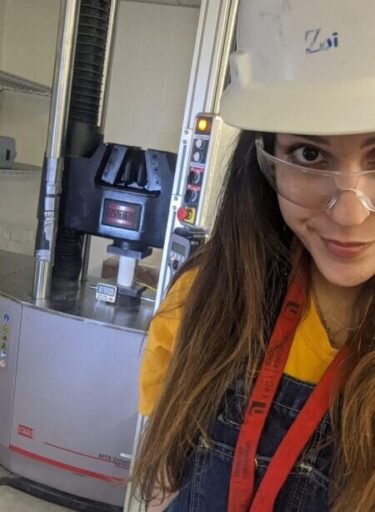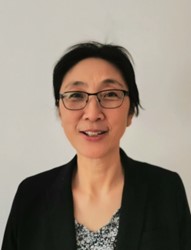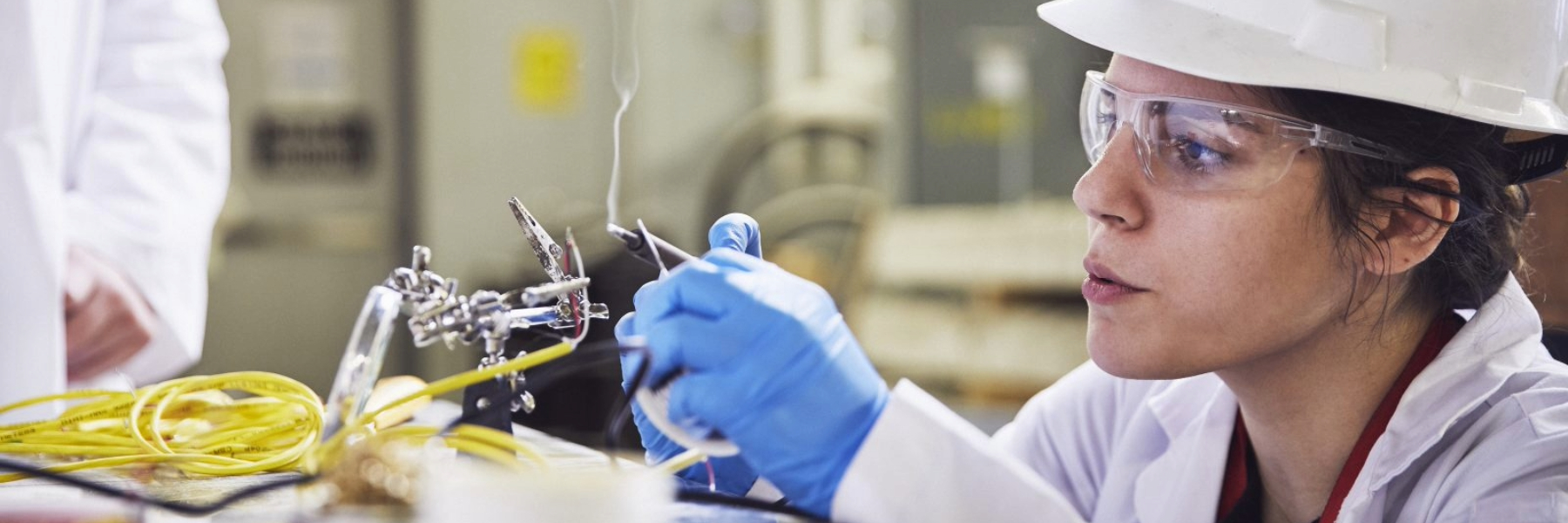Each year on June 23, International Women in Engineering Day honours the efforts and achievements of women while highlighting the need for diversification in the field. In celebration of this day, York University’s Lassonde School of Engineering is spotlighting Zoi Ralli, Stavroula Pantazopoulou and Baoxin Hu – three of the many inspiring women at Lassonde who are demonstrating excellence in engineering through their passion, expertise and solutions-driven research.
Zoi Ralli

A postdoctoral fellow in the Civil Engineering Department, Ralli has developed and tested a novel, sustainable concrete formulated with recycled waste material instead of cement.
“Cement production is a very energy-intensive process,” explains Ralli, “and it is responsible for seven per cent of carbon dioxide emissions globally.”
Ralli’s cement-free concrete addresses the extreme sustainability concerns of traditional concrete production, boasting a 70 to 90 per cent reduction in carbon dioxide emissions. The material was developed with byproducts from a Canadian quarry, comprised of Earth materials and minerals like silicon and aluminum. She also designed the concrete with microfibers to improve its overall strength and performance. These steel, needle-like fibers allow the concrete to withstand harsh conditions, while minimizing cracking and increasing durability.
“Our paper shows that it is possible to completely eliminate the use of cement by replacing it with geological and industrial waste materials to develop a high-performance and sustainable concrete,” she says.
Stavroula Pantazopoulou

Another achievement worth celebrating is the recent recognition of Lassonde Professor Stavroula Pantazopoulou – coincidentally, Ralli’s supervisor – as a fellow of the prestigious Canadian Academy of Engineering (CAE). This distinction reflects her significant research impact and dedication to science and engineering, further underscoring the exceptional contributions of women at Lassonde.
“For me, this award represents the most important recognition of my work,” says Pantazopoulou, who was one of a small number of highly accomplished individuals to be selected as a CAE fellow this year. “No other award compares to this one.”
This commendation is a testament to the transformative efforts Pantazopoulou has made to the field of structural engineering. Her research focuses on addressing a range of complex and emerging infrastructure concerns. In particular, she dedicates her work to enhancing the structural design of various infrastructure, to improve resistance against earthquakes and other extreme events. Though modern infrastructure is typically developed with resilient materials, many older buildings are constructed with less advanced components, posing safety risks to occupants. To address this concern, Pantazopoulou’s work aims to upgrade and retrofit older buildings with new and innovative materials.
As a newly appointed CAE fellow, she is positioned to further advance the field of structural engineering and elevate her research to new heights.
Baoxin Hu

Hu, a professor in the Department of Earth & Space Science & Engineering, is an accomplished researcher at Lassonde who recently secured significant funding – three grants in total – from the Canadian Space Agency and Forestry Futures Trust Ontario. She will use this support to advance her forest management research through remotely sensed data analysis and the development of various artificial intelligence (AI) technologies.
Motivated by the urgent demand for accurate information regarding carbon sequestered forest ecosystems, as well as the need for highly qualified personnel with particular skills and knowledge to help tackle climate change, Hu is leading a multidisciplinary team to address and create solutions for carbon stock in forest ecosystems. Through funding from the Canadian Space Agency, the team will use satellite Earth observation data to develop AI methods that can accurately quantify carbon flux and stocks in Canadian forests.
With funding from Forestry Futures Trust Ontario, Hu’s second project is aimed at improving sustainable forest management and biodiversity conservation by developing AI methods to survey lichens in Canadian forests. These organisms play many critical roles in forest ecosystem dynamics, like serving as a dietary source for various animals and supporting water and nutrient cycling. Using single photon LiDAR (SPL) data, Hu and her team will map and characterize lichens in the Ontario boreal forest and use this information to develop AI methods that can effectively predict lichen distribution in other forest ecosystems.
Hu’s third project, also funded by Forestry Futures Trust Ontario, will explore drone-based AI technologies, referred to as remotely piloted aircraft systems (RPAS), and their ability to analyze conditions of forest ecosystems. Specifically, these RPAS will collect data concerning the effects of silviculture, which is the practice of controlling the growth and composition of forests. By collecting this data, different forest ecosystems can be classified based on the intensity of silviculture, enabling forest managers to gain a more comprehensive understanding of forest environments.
To learn more about the ways Lassonde provides support, resources and opportunities for women in engineering, visit Lassonde’s Women in Science & Engineering web page.


